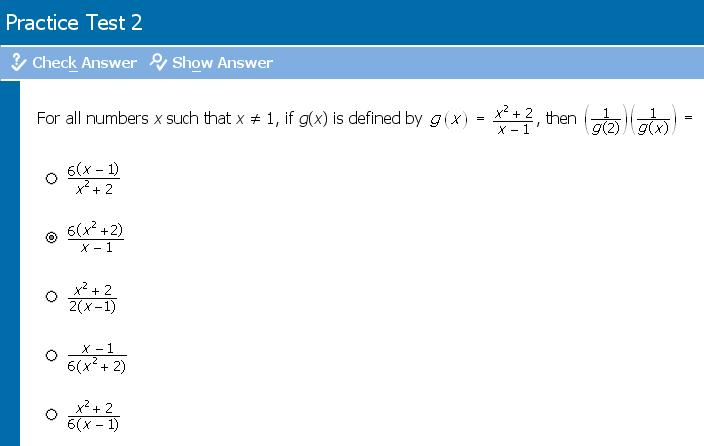Events & Promotions
|
|

GMAT Club Daily Prep
Thank you for using the timer - this advanced tool can estimate your performance and suggest more practice questions. We have subscribed you to Daily Prep Questions via email.
Customized
for You
Track
Your Progress
Practice
Pays
Not interested in getting valuable practice questions and articles delivered to your email? No problem, unsubscribe here.
- Nov 20
07:30 AM PST
-08:30 AM PST
Learn what truly sets the UC Riverside MBA apart and how it helps in your professional growth - Nov 22
11:00 AM IST
-01:00 PM IST
Do RC/MSR passages scare you? e-GMAT is conducting a masterclass to help you learn – Learn effective reading strategies Tackle difficult RC & MSR with confidence Excel in timed test environment - Nov 23
11:00 AM IST
-01:00 PM IST
Attend this free GMAT Algebra Webinar and learn how to master the most challenging Inequalities and Absolute Value problems with ease. - Nov 25
10:00 AM EST
-11:00 AM EST
Prefer video-based learning? The Target Test Prep OnDemand course is a one-of-a-kind video masterclass featuring 400 hours of lecture-style teaching by Scott Woodbury-Stewart, founder of Target Test Prep and one of the most accomplished GMAT instructors.
Originally posted by Lolaergasheva on 19 Feb 2011, 09:34.
Last edited by Bunuel on 16 Jun 2017, 15:11, edited 2 times in total.
Last edited by Bunuel on 16 Jun 2017, 15:11, edited 2 times in total.
Renamed the topic and edited the question.
Kudos
Bookmarks
D
Be sure to select an answer first to save it in the Error Log before revealing the correct answer (OA)!
Difficulty:
 15%
(low)
15%
(low)
Question Stats:
82% (01:21) correct 18%
(01:36)
wrong
18%
(01:36)
wrong  based on 1097
sessions
based on 1097
sessions
History
Date
Time
Result
Not Attempted Yet
For all numbers x such that x ≠ 1, if g(x) is defined by \(g(x)= \frac{x^2 + 2}{x - 1}\), then \((\frac{1}{g(2)})*(\frac{1}{g(x)})=\)
A. \(\frac{6(x-1)}{x^2+2}\)
B. \(\frac{6(x^2+2)}{x-1}\)
C. \(\frac{x^2+2}{2(x-1)}\)
D. \(\frac{x-1}{6(x^2+2)}\)
E. \(\frac{x^2+2}{6(x-1)}\)
A. \(\frac{6(x-1)}{x^2+2}\)
B. \(\frac{6(x^2+2)}{x-1}\)
C. \(\frac{x^2+2}{2(x-1)}\)
D. \(\frac{x-1}{6(x^2+2)}\)
E. \(\frac{x^2+2}{6(x-1)}\)
Kudos
Bookmarks
For all numbers x such that x ≠ 1, if g(x) is defined by \(g(x)= \frac{x^2 + 2}{x - 1}\), then \((\frac{1}{g(2)})*(\frac{1}{g(x)})=\)
A. \(\frac{6(x-1)}{x^2+2}\)
B. \(\frac{6(x^2+2)}{x-1}\)
C. \(\frac{x^2+2}{2(x-1)}\)
D. \(\frac{x-1}{6(x^2+2)}\)
E. \(\frac{x^2+2}{6(x-1)}\)
Given: \(g(x)=\frac{x^2+2}{x-1}\) (so \(\frac{1}{g(x)}=\frac{x-1}{x^2+2}\)). Question: \(\frac{1}{g(2)}*\frac{1}{g(x)}=\)
\(g(2)=\frac{2^2+2}{2-1}=6\) --> \(\frac{1}{g(2)}*\frac{1}{g(x)}=\frac{1}{6}*\frac{x-1}{x^2+2}=\frac{x-1}{6(x^2+2)}\).
Answer: D.

equal_115.PNG [ 57.82 KiB | Viewed 21253 times ]
A. \(\frac{6(x-1)}{x^2+2}\)
B. \(\frac{6(x^2+2)}{x-1}\)
C. \(\frac{x^2+2}{2(x-1)}\)
D. \(\frac{x-1}{6(x^2+2)}\)
E. \(\frac{x^2+2}{6(x-1)}\)
Given: \(g(x)=\frac{x^2+2}{x-1}\) (so \(\frac{1}{g(x)}=\frac{x-1}{x^2+2}\)). Question: \(\frac{1}{g(2)}*\frac{1}{g(x)}=\)
\(g(2)=\frac{2^2+2}{2-1}=6\) --> \(\frac{1}{g(2)}*\frac{1}{g(x)}=\frac{1}{6}*\frac{x-1}{x^2+2}=\frac{x-1}{6(x^2+2)}\).
Answer: D.
Attachment:
equal_115.PNG [ 57.82 KiB | Viewed 21253 times ]
Kudos
Bookmarks
Thank you for fast reply, but why E is not an answer. I mean why you reversed, took reciprocal. sorry for my English.











